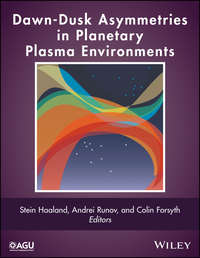Stein Haaland - Dawn-Dusk Asymmetries in Planetary Plasma Environments

DawnDusk Asymmetries in Planetary Plasma Environments Dawn-dusk asymmetries are ubiquitous features of the plasma environment of many of the planets in our solar system. They occur when a particular process or feature is more pronounced at one side of a planet than the other. For example, recent observations indicate that Earth's magnetopause is thicker at dawn than at dusk. Likewise, auroral breakups at Earth are more likely to occur in the pre-midnight than post-midnight sectors. Increasing availability of remotely sensed and in situ measurements of planetary ionospheres, magnetospheres and their interfaces to the solar wind have revealed significant and persistent dawn-dusk asymmetries. As yet there is no consensus regarding the source of many of these asymmetries, nor the physical mechanisms by which they are produced and maintained. Volume highlights include: A comprehensive and updated overview of current knowledge about dawn-dusk asymmetries in the plasma environments of planets in our solar system and the mechanisms behind them Valuable contributions from internationally recognized experts, covering both observations, simulations and theories discussing all important aspects of dawn-dusk asymmetries Space weather effects are caused by processes in space, mainly the magnetotail, and can be highly localized on ground. Knowing where the source, i.e., where dawn-dusk location is will allow for a better prediction of where the effects on ground will be most pronounced Covering both observational and theoretical aspects of dawn dusk asymmetries, Dawn-Dusk Asymmetries in Planetary Plasma Environments will be a valuable resource for academic researchers in space physics, planetary science, astrophysics, physics, geophysics and earth science.







